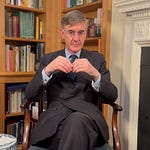Margaret Roberts, later Mrs. Thatcher, and finally Baroness Thatcher, LG, OM, is one of the truly great figures of modern times. The fiftieth anniversary of her election as Tory leader is a good moment to reflect on her legacy, and on what can be learnt from her success.
I knew Margaret Thatcher after she had been Prime Minister, but never well. Yet her force of personality, on every occasion I was introduced to her, even in her frail old age, is utterly memorable.
My father, on the other hand, knew her from the late 1940s until his own death in 2012, a few months before hers; from her Presidency of the Oxford University Conservative Association as a young undergraduate, through to her retirement. He was always impressed by her strength of purpose and single-mindedness.
The first lesson from Margaret Thatcher is that she was not overawed by the establishment. She challenged it and saw its weaknesses.
One of the United Kingdom's strengths is its institutions and its long history, but sometimes this can be a mere facade, a veneer covering a hollowed-out shell. It may seem impressive, but underneath it can be rotten.
Margaret Thatcher saw this, which led to her challenging institutions. The Civil Service was reformed and reduced, the BBC was put under pressure, the Foreign Office was often ignored.
These are but a few examples of how she was determined to do more than manage decline. An ancient institution was not good because of its age, but because of what it could do. If it could not fulfil its main function, it was ripe for reform.
This affected the City of London when ‘Big Bang’ changed a cosy club into one of the drivers of economic success. The investment that flowed into the country from this reform was enormous, with the UK consistently the largest European recipient of foreign direct investment. The American Merchant banks swarmed into London, widening and deepening its pool of capital, and making the City fundamentally more commercial.
This was, in fact, dependent on the radical decision, taken within weeks of being elected, to abolish exchange controls. It is now peculiar to remember that it used to be illegal to take more than £50 out of the country when going on holiday abroad. My first passport, as a child, has a section in it to fill out saying how much cash was being taken.
Yet this law was thought to be essential to the stability of sterling, and that without it there would be a run on the pound. Instead, the opposite happened - the pound rose strongly against the dollar after the policy was implemented.
This is the second lesson, Prime Ministers need to follow their own judgement and challenge consensus opinion. If consensus opinion were right the current government would be flourishing, not in the slough of economic despond.














